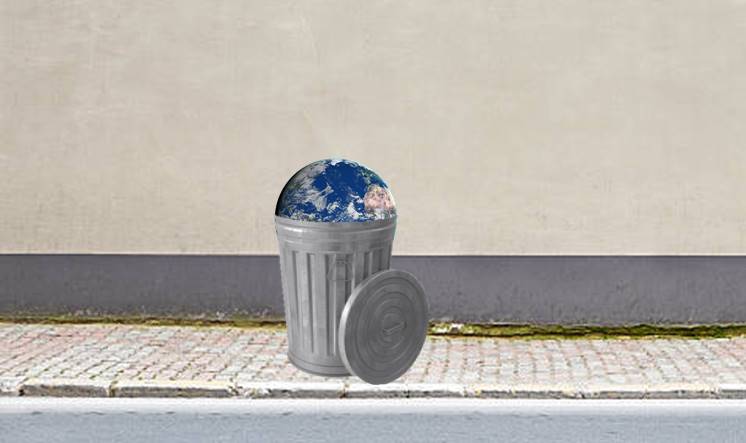Simply put, it’s not waste we are throwing in the bin, but the days of lives of our grandchildren and great-grandchildren. Seen in this way, the real garbage is not that which is being thrown away, but those who made it.

Voja Zanetic
It has been 14 days since the last editorial, published at this same place.
In the meantime, if we can rely on www.worldcounts.com and a little math, the world has become richer by about 81 million tons of garbage. But forget the planet and the global situation, let’s analyze personal contributions. So let’s say: during the preparation for writing this column, the author supplemented the contents of his bin can with a usual amount of garbage. It’s not polite to rummage through waste, even if one’s own, but who knows when the opportunity for this type of storytelling will come up again.
So, the contents of bin, created in the time period described above: cigarette butts and ashes from one half-empty ashtray; a bottle of yogurt, finished in two days; a paper bag from the bakery, a melted cheese wrapper, a plastic capsule from an espresso machine, a chocolate wrapping foil, an ATM receipt; an incomprehensible amount of paper from the cash registers of shops and newsagents; a bag from the supermarket fruit purchase; a banana peel; a plastic bottle of used shower gel; paper from a printer with yesterday’s writing, it had an error. There must have been something else at the bottom, but I couldn’t be bothered to continue digging.
Your keynote speaker is a garbage factory …
* * * * *
Eternally searching for the modalities of a perfect existence, Homo Sapiens, after all the religions and ideologies which offered paradise in Heaven or on Earth – decided to collect heavenly objects in shopping baskets. Consumerism, the dominant social system of all continents except, to some extent, Africa, is a beating bat from two ends that relentlessly strikes the planet. On one end, you have us, buying like crazy, and on the other end you have those who create that desirable craziness with their hyper-production. The planet we are on is a source of energy and raw materials for production, and the final product is garbage created by consumption. In between these two destinations are billions of human beings who, despite the very simple process that is underway, are still looking for another, higher meaning of their existence. And there is none, it’s gone. Let’s fill the bins and take them to the containers, that’s what we were born to do.
To make this claim about the new purposefulness of our species even more plausible, let’s pay attention to the appearance of waste even where it’s unexpected, and therefore not visible: fake news is actually information garbage, increasingly popular hybrid political regimes are democracies on their way to the container, propaganda is a policy that has broken down and can no longer be recycled. Before the concept of a rock or movie star is thrown in the trash, the transitional form is called an influencer, and flat earths and internet super-doctors are beings from the landfill of science. The events in Ukraine are actually the First World War which has gone bad, stinking from the wasteland of history.
Waste everywhere. And we don’t know what to do with it.
* * * * *
There are almost eight billion people on the planet now, eight times more than it was estimated to have existed only two centuries ago. In addition to that, people now live on average about twice as long as they did back then, and it is difficult to calculate how many times more resources are spent per one breathing member of the human race. In order for the waste in this state of our reproduction to be lesser, or at least more of it for processing, it is not enough for us to just be aware of pollution on Earth and share the love for nature that ignites inside our apartment buildings. We need a sincere global admission that we did not inherit this world in order to leave it in the landfill, all the while showing future generations the long middle finger of consumerism. Simply put, it’s not waste we are throwing in the bin, but the days of lives of our grandchildren and great-grandchildren. Seen in this way, the real garbage is not that which is being thrown away, but those who made it.
Happy recycling, civilization.



Leave A Comment